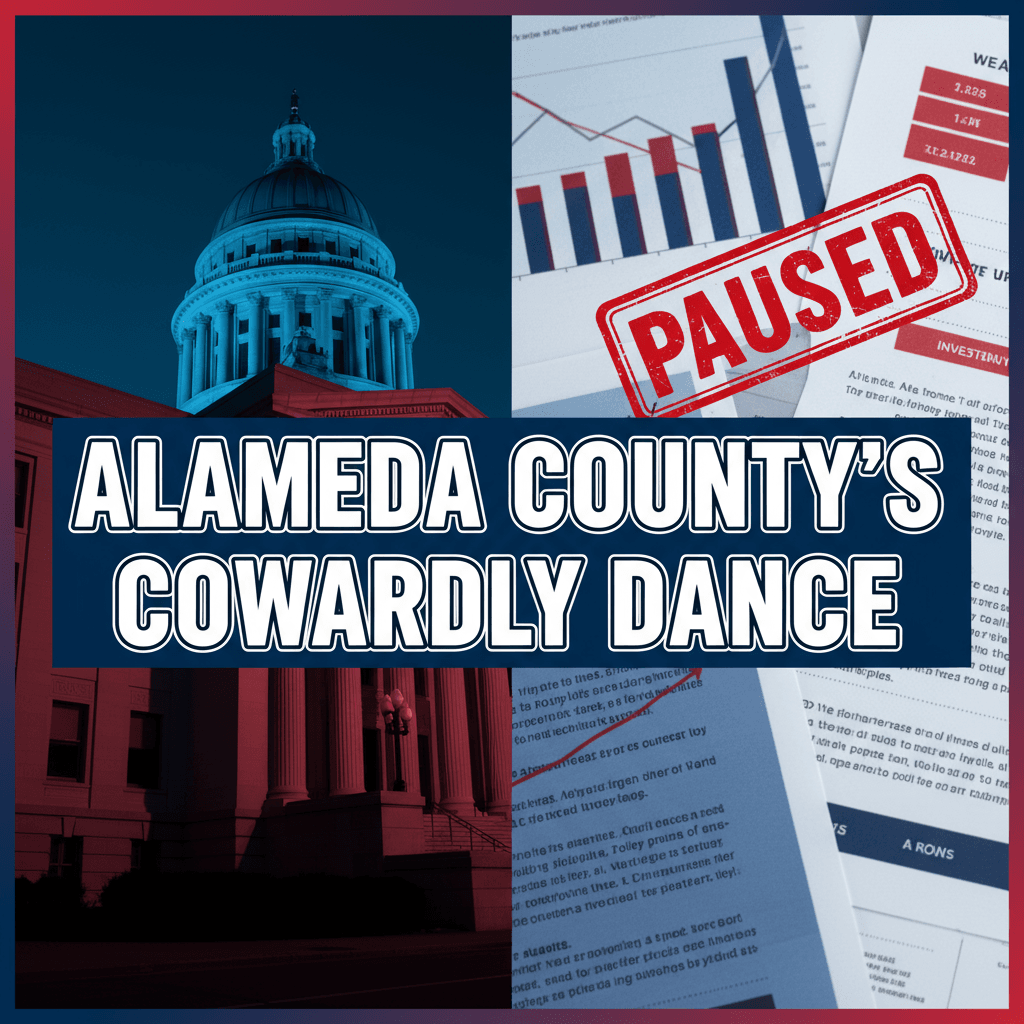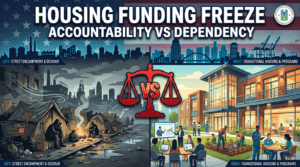Alameda County’s Cowardly Dance: Supervisors Adopt “Ethical” Investment Policy They’re Too Scared to Implement


Local officials cave to activist pressure while avoiding real accountability in shameful display of political theater
In a masterclass of political cowardice disguised as progressive virtue signaling, Alameda County supervisors last week voted 4-1 to adopt an “ethical investment policy” while simultaneously deciding to shelve its implementation indefinitely. This bureaucratic sleight of hand represents everything wrong with modern local governance: pandering to radical activists while avoiding any real consequences or accountability.
The Anti-Israel Agenda Hiding Behind “Ethics”
Make no mistake about what’s really happening here. This so-called “ethical investment policy” isn’t some noble attempt at responsible stewardship of taxpayer funds. It’s a thinly veiled capitulation to pro-Palestinian activists who have been pressuring the county to divest from companies that do business with Israel – America’s most important democratic ally in the Middle East.
The timing and support base tell the whole story. Pro-Palestinian groups have been lobbying hard for this policy, seeing it as a backdoor mechanism to implement the discriminatory Boycott, Divestment, and Sanctions (BDS) movement against Israel. These are the same activists who regularly disrupt public meetings, demand the county take positions on complex international affairs far outside its jurisdiction, and push an agenda that would ultimately harm both American interests and the cause of peace in the Middle East.
What’s particularly galling is the euphemistic language being used. “Ethical investment policy” sounds reasonable enough – after all, who could be against ethics? But this is classic progressive doublespeak. When activists and politicians use terms like “ethical” and “moral” in this context, they’re really talking about imposing their narrow ideological worldview on public institutions and taxpayer money.
A Profile in Political Cowardice
The 4-1 vote followed by immediate implementation pause reveals the profound intellectual and moral bankruptcy of this board majority. If supervisors truly believed this policy was necessary and just, they would implement it immediately. If they had serious concerns about its implications, they would vote it down. Instead, they chose the coward’s path: giving activists the symbolic victory they demanded while avoiding any real-world consequences that might generate backlash.
This is governance by focus group, where elected officials make decisions based not on principle or sound policy analysis, but on which choice will generate the least political heat. It’s the kind of leadership that has made California a laughingstock in much of the country – all virtue signaling and no substance.
The lone dissenting supervisor deserves credit for having the backbone to reject this charade outright. While their colleagues were busy triangulating their way through a politically sensitive issue, at least one member of the board demonstrated that principles still matter more than political expediency.
The Dangerous Precedent of Activist Capture
This episode represents a troubling trend in local governance: the systematic capture of public institutions by well-organized activist groups with radical agendas. These groups understand that local government is often the weakest link in the democratic chain – officials with limited resources, small staffs, and minimal media scrutiny who can be pressured into adopting policies they would never dare implement at higher levels of government.
The pro-Palestinian movement’s strategy here is particularly insidious. Unable to achieve their anti-Israel goals through federal policy or even state legislation, they’re targeting county and municipal governments, hoping to create a patchwork of local policies that collectively advance their cause. It’s death by a thousand cuts, and Alameda County just handed them another blade.
What’s especially concerning is how this activist capture undermines the proper role of local government. County supervisors should be focused on core public services: maintaining roads, ensuring public safety, managing county facilities, and delivering essential services efficiently and cost-effectively. Instead, they’re being dragged into international relations and foreign policy – areas where they have neither expertise nor legitimate authority.
The Economic Folly of Political Investing
Beyond the political and moral problems with this policy lies a fundamental economic issue: using investment decisions as a tool for political activism inevitably compromises returns and increases risk for taxpayers. Fiduciary duty requires that public officials manage taxpayer funds to maximize returns within appropriate risk parameters, not to advance political agendas.
When investment decisions are driven by ideology rather than financial analysis, taxpayers suffer. Studies of divestment campaigns consistently show that they reduce returns and increase portfolio volatility. In effect, Alameda County supervisors are proposing to gamble with taxpayer money to satisfy activist demands – a clear violation of their basic responsibilities.
The irony is rich: these same supervisors regularly complain about budget constraints and the need for more revenue to fund county services. Yet they’re simultaneously considering policies that would deliberately reduce investment returns and shrink the county’s financial resources. It’s fiscal irresponsibility dressed up as moral leadership.
The Israel Double Standard
The targeting of Israel in this “ethical investment” framework exposes the profound hypocrisy at the heart of the progressive movement. Israel, a vibrant democracy with robust civil liberties, independent courts, and a free press, is somehow deemed unworthy of investment. Meanwhile, the policy contains no similar provisions regarding actual authoritarian regimes that systematically violate human rights.
This selective outrage reveals that the real motivation isn’t ethics at all – it’s anti-Israel animus driven by a radical ideology that views the Jewish state as uniquely illegitimate. The same activists pushing this policy have been notably silent about investments in companies that do business with China, Russia, Iran, or any number of actual human rights violators.
The double standard is particularly galling given Israel’s status as America’s most reliable democratic ally in a strategically crucial region. While other Middle Eastern nations restrict religious freedom, oppress women, and execute political dissidents, Israel maintains democratic institutions and protects the rights of all its citizens regardless of religion or ethnicity.
A Betrayal of Taxpayer Trust
Perhaps most fundamentally, this entire episode represents a betrayal of the trust that taxpayers place in their elected officials. Residents of Alameda County don’t elect supervisors to wage proxy wars against Israel or advance the foreign policy preferences of activist groups. They elect them to manage county business competently and efficiently.
The fact that supervisors are even considering using public funds as a weapon in international political disputes shows how far local government has drifted from its core mission. Taxpayers deserve better than having their money held hostage to the ideological whims of radical activists and the political calculations of cowardly officials.
The Path Forward
Alameda County supervisors now have an opportunity to correct this mistake. During their “review” period, they should listen to the many residents who oppose politicizing county investments and who want their elected officials focused on actual county business rather than international activism.
The policy should be repealed entirely, not merely modified or delayed. County investment decisions should be made based on financial merit and fiduciary responsibility, not political pressure from activist groups with radical agendas.
More broadly, this episode should serve as a wake-up call for taxpayers throughout California and beyond. Local government matters, and when citizens don’t pay attention, activist groups fill the vacuum. The only way to prevent further erosion of responsible governance is through sustained civic engagement and accountability.
Alameda County supervisors have shown their true colors: they’re more interested in appeasing radical activists than serving their constituents. Voters should remember this betrayal when these officials next face reelection. In a functioning democracy, cowardice and ideological extremism should have consequences.
The question now is whether the people of Alameda County will demand better leadership or continue to tolerate this kind of political theater masquerading as governance. Their choice will determine not just the future of county investment policy, but the broader direction of local democracy in one of America’s most important regions.











